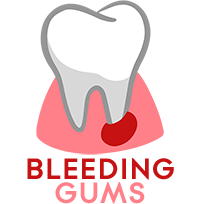
The most important thing to remember when taking care of your gums is that maintaining their hygiene begins with you at home. The way you care for your mouth will have a great bearing on whether you have healthy gums.
Dentists recommend that you brush your teeth at least twice a day, in the morning and the evening. You may also wish to brush again after meals. Brushing is necessary to dislodge food debris which can form plaque and to remove the plaque itself. Plaque is a substance which coats your teeth after you have eating sugary or starchy foods. If plaque is left on the gum line of teeth then your gums can become diseased and sensitive. The fluoride found in most tooth pastes can strengthen the enamel in your teeth which protects against plaque building up. Tap water, also containing fluoride, has the same effect.
With careful brushing then you ought to be able to successfully remove plaque. It is important though that you also floss. By pulling dental floss between your teeth you are removing plaque and debris from areas which tooth brushes will not reach, however diligently you brush. It is vital that this is done as plaque can easily build up between the teeth and begin to affect your gums. In some cases dentists recommend that special mouth wash is used to give your gums extra protection against disease.
By making sure that you pursue a healthy and balanced diet you can lessen the chances of severe plaque build ups in the first place. Sugary and starchy foods ought to be eaten only in moderation so that too much plaque is not formed. Preventive measures such as this are always preferable to treatments.
Smoking tobacco can irritate the gums and refraining from doing so will benefit your gums and reduce the chances of them becoming diseased. Additionally, smoking compromises the mouth’s ability to produce saliva, which is one of your natural defences against plaque. By stopping smoking you increase the amount of saliva in your mouth and decrease the irritation caused to your gums.
Chewing gum can also help to keep your gums healthy. Of course brushing and flossing are always preferable but if you are in a situation where it is not possible to do so then chewing gum is a good alternative. The motion of chewing gum helps to dislodge food debris and so lessens the likelihood of plaque forming. This motion also stimulates the production of saliva which helps to combat plaque.
As you can see there are a number of simple things you can do to look after your gums and if you follow this advice then you should have no problems. The last important thing to remember though is to visit your dentist regularly so that your mouth can be monitored by a trained professional. They are experts at spotting the signs of problems with your gums and will be able to diagnose and treat any issues which might occur. It is always better to deal with bleeding gums early, rather than allowing it to develop into something much worse.
